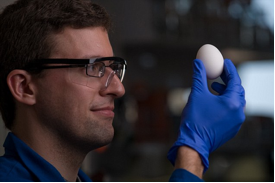This is how you do it.

Pic source: http://dailym.ai/1H0XIZB
Yes you heard it right! But no, it is not going to make a mark in your kitchen. Scientists have proved that it is now possible to unboil an egg using certain chemicals. Though it might not seem like a breakthrough that is the need of the hour, researchers from University of California and the University of Western Australia claim that this method could benefit areas as diverse as food processing industries to cancer research.
They boiled an egg for about 20 minutes at 90°C (194°F) before using urea, which is a chemical compound found in urine. When urea is added, it makes the egg whites go back to its original liquefied form. When this liquefied egg mixture was then dumped into the vortex fluid device, it spins the materials at a very high speed to aid in detangling and proper refolding of the protein structures back to their original shape. The time taken for this process is only a few minutes which is most definitely a step forward as compared to the traditional methods of refolding which could take days and has a high chance of misfolding. This method also reduces the skyrocketing cost of producing certain therapeutic antibodies which are otherwise produced in rather expensive hamster ovarian cells. This work has been published in ChemBiochem Journal.